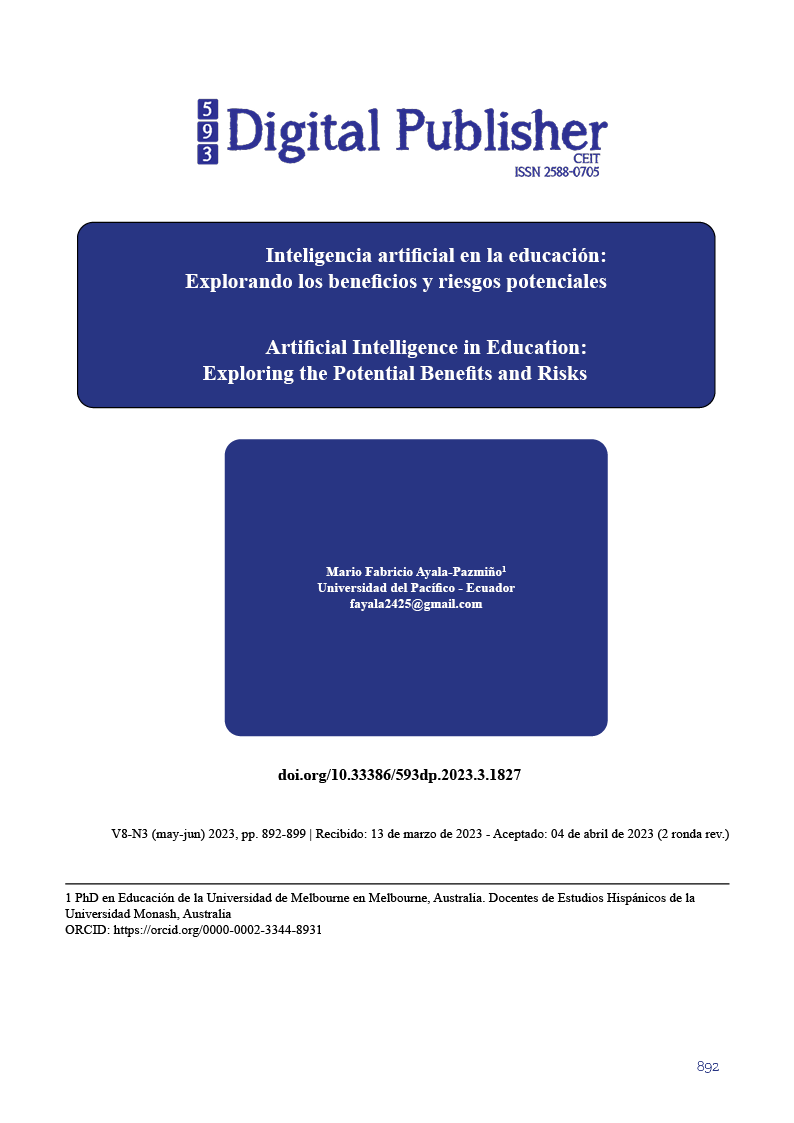Inteligencia artificial en la educación: Explorando los beneficios y riesgos potenciales
Contenido principal del artículo
Resumen
La inteligencia artificial (IA) tiene el potencial de transformar la educación al mejorar los resultados de la enseñanza y el aprendizaje. Sin embargo, como con cualquier nueva tecnología, también existen riesgos asociados con su uso. Este documento explora los beneficios y riesgos potenciales de la IA en la educación, incluido el aprendizaje personalizado, la evaluación mejorada, la reducción del tiempo de planificación para los maestros, y el riesgo de hacer trampa. Basándose en una variedad de estudios y perspectivas, el documento argumenta que, si bien existen ciertos riesgos asociados con la IA, los beneficios que ofrece a la educación son significativos. El documento concluye sugiriendo la necesidad de más investigación empírica sobre el impacto de la IA en la educación y la importancia de preparar a los estudiantes para un futuro en el que las máquinas desempeñarán un papel de liderazgo.
Descargas
Detalles del artículo

Esta obra está bajo una licencia internacional Creative Commons Atribución-NoComercial-CompartirIgual 4.0.
1. Derechos de autor
Las obras que se publican en 593 Digital Publisher CEIT están sujetas a los siguientes términos:
1.1. 593 Digital Publisher CEIT, conserva los derechos patrimoniales (copyright) de las obras publicadas, favorece y permite la reutilización de las mismas bajo la licencia Licencia Creative Commons 4.0 de Reconocimiento-NoComercial-CompartirIgual 4.0, por lo cual se pueden copiar, usar, difundir, transmitir y exponer públicamente, siempre que:
1.1.a. Se cite la autoría y fuente original de su publicación (revista, editorial, URL).
1.1.b. No se usen para fines comerciales u onerosos.
1.1.c. Se mencione la existencia y especificaciones de esta licencia de uso.
Citas
Baker, R., & Siemens, G. (2014). Educational data mining and learning analytics. Handbook of educational psychology, 2, 507-524.
Brackett, M. A., Rivers, S. E., Reyes, M. R., & Salovey, P. (2019). Enhancing educational opportunities by integrating social–emotional learning (SEL) into education policy and practice. Educational Psychologist, 54(4), 274-293. doi: 10.1080/00461520.2019.1632057
Gee, J. P. (2018). What video games have to teach us about learning and literacy. Palgrave Macmillan.
Hattie, J. (2012). Visible learning for teachers: Maximizing impact on learning. Routledge.
Kavale, K. A., & Forness, S. R. (2019). Cheating and plagiarism in schools and colleges. Psychology Press.
Kelleher, C., & Tierney, B. (2018). Artificial intelligence in education: Applications and prospects. AI Magazine, 39(3), 45-49.
Kim, J., Park, H., Jo, I., & Choi, H. (2019). Designing augmented reality simulation for science education: Affordances and constraints. Education Sciences, 9(4), 318.
Kulkarni, C., Cambre, J., Kotturi, Y., Bernstein, M. S., & Klemmer, S. R. (2015). Peer and self assessment in massive online classes. ACM Transactions on Computer-Human Interaction (TOCHI), 22(2), 1-30.
Liao, Y., Huang, R., Sun, C., & Li, X. (2021). Artificial intelligence in education: Opportunities and challenges from a learning science perspective. Frontiers in Education, 6, 1-7.
López-Pérez, M.V., Pérez-Rodríguez, M.A., & Gutiérrez-Santiuste, E. (2020). Artificial intelligence in education: A review. Frontiers in Psychology, 11, 135. doi: 10.3389/fpsyg.2020.00135
Mandernach, B. J. (2018). Effective grading practices in the online classroom: A faculty perspective. Journal of Educators Online, 15(1), 1-22.
Mather, R., & Yau, J. Y. (2019). Artificial intelligence education: Implications for teaching and learning. Educational Research Review, 27, 233-247. https://doi.org/10.1016/j.edurev.2019.03.003
National Education Association. (2020). Preparing educators for AI. https://www.nea.org/resource-library/preparing-educators-ai
Pardo-Ballester, C., Tomás, D., & López-López, M. C. (2021). Exploring the potential of chatbots in foreign language learning: a systematic review. Computer Assisted Language Learning, 34(2), 153-182.
Pellegrino, J. W., & Hilton, M. L. (2013). Education for life and work: Developing transferable knowledge and skills in the 21st century. National Academies Press.
Roorda, D. L., Koomen, H. M. Y., Spilt, J. L., & Oort, F. J. (2011). The influence of affective teacher–student relationships on students' school engagement and achievement: A meta-analytic approach. Review of Educational Research, 81(4), 493-529. https://doi.org/10.3102/0034654311421793
Sclater, N., & Peasgood, A. (2018). Artificial intelligence in education: Promises and implications for teaching and learning. British Journal of Educational Technology, 49(4), 745-760. doi: 10.1111/bjet.12638
Sulik, M. J., Huerta, M., & Ziegler, J. C. (2017). The development of handwriting speed and legibility in grades 1-9. Journal of educational psychology, 109(6), 800-813.
World Economic Forum. (2018). The Future of Jobs Report 2018. Retrieved from https://www.weforum.org/reports/the-future-of-jobs-report-2018.


